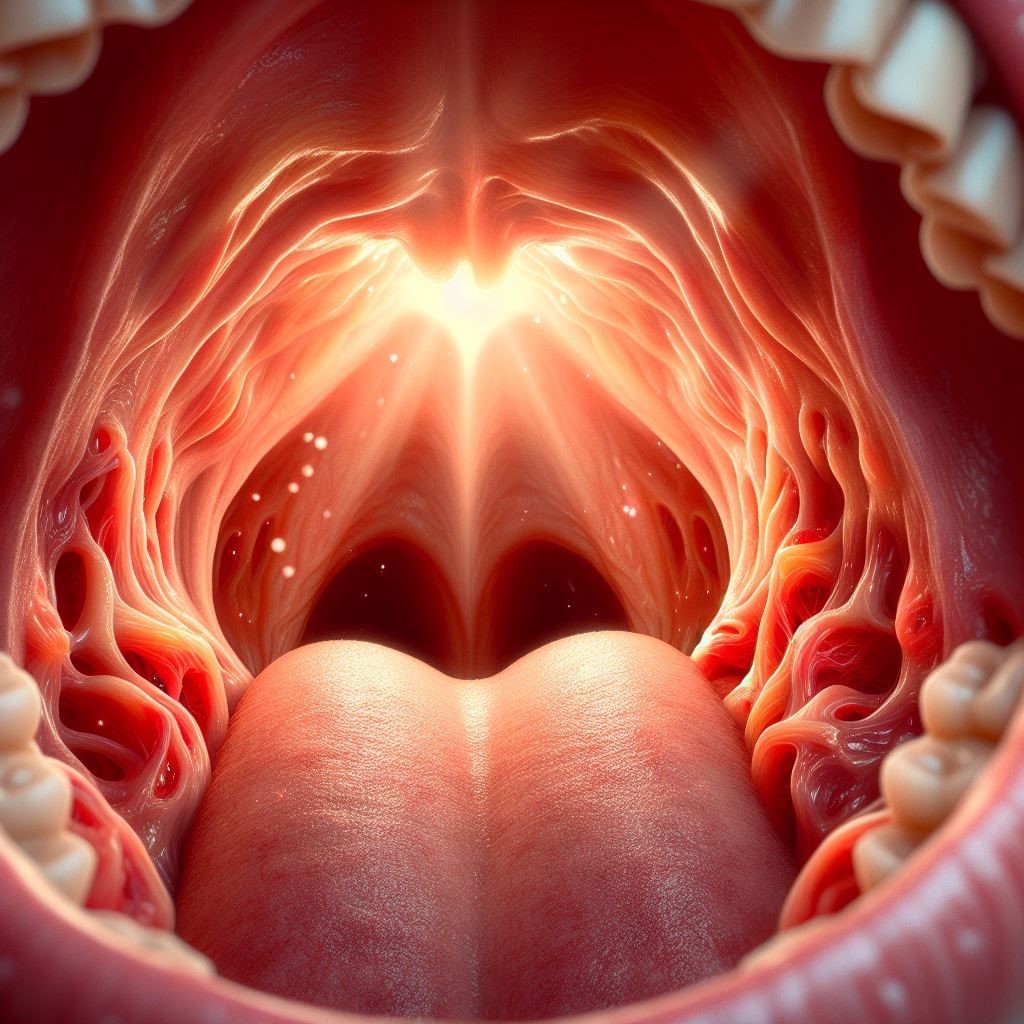Holes in Tonsils: Unveiling the Mystery Behind Sore Throat Signs
Introduction
Having holes in tonsils can be an alarming discovery. Small divots or pockets on the surface of your tonsils spur questions about what’s normal versus abnormal for your sore throat symptoms. Read on to learn what causes holes in tonsils, when they indicate an underlying condition, and how to find relief if these pits become problematic.
What Are Holes in Tonsils?
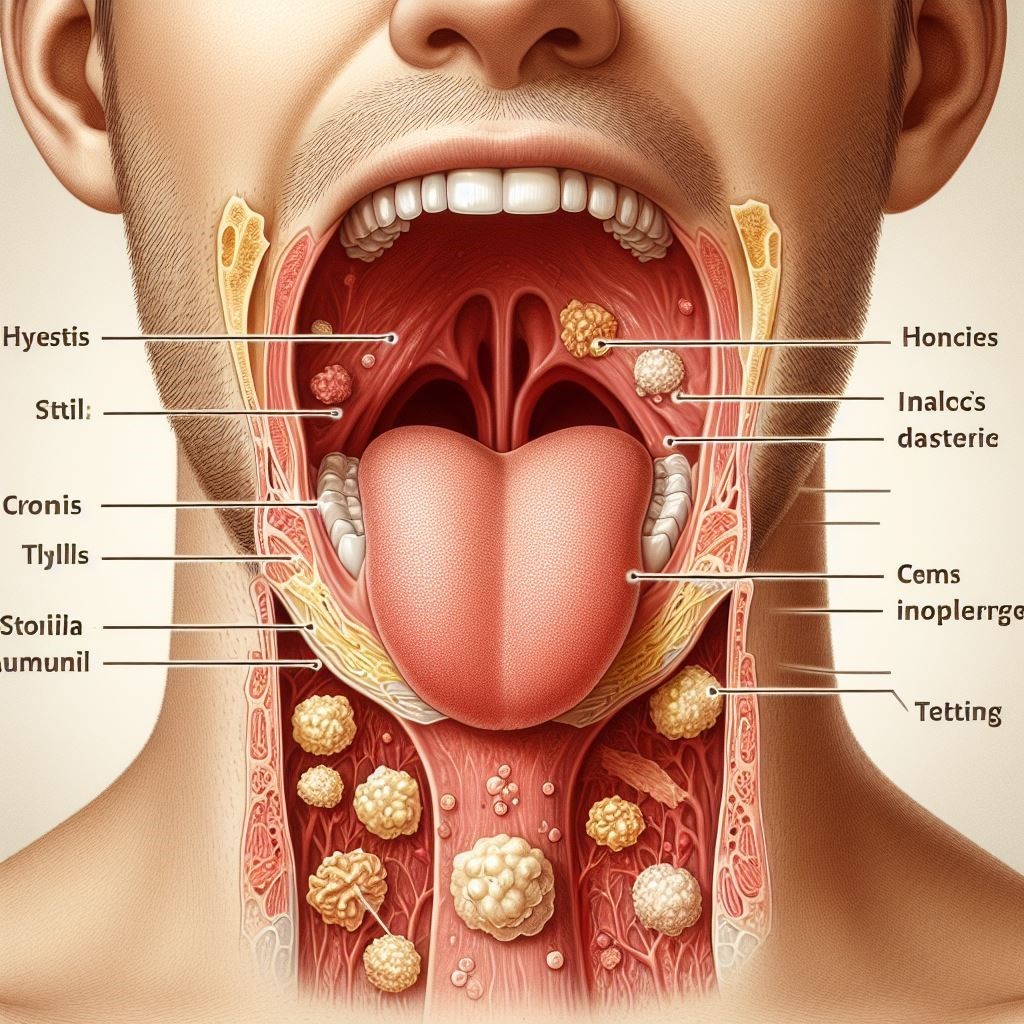
Your tonsils are oval-shaped glands located on either side of the back of your throat. Composed of tissue with crevices and tunnels, tonsils work to trap germs entering your throat and prevent infection. Holes in tonsils refer to the small divots and pockets that form on the surface of the tonsils.
These holes or pits are a normal part of your tonsils’ anatomy. The specific name for them is crypts.
Crypts allow your tonsils to capture and sample foreign invaders like bacteria and viruses. Your tonsil crypts also contain infection-fighting cells to help ward off illness.
It’s very common for tonsils to develop deep holes as a normal part of their function – in fact, over 90% of the population has them. The depth, size, and number of holes can vary from person to person.
What Causes Holes in Tonsils?
Tonsil crypts start to form during childhood as your tonsils develop. The underlying cause is simply the natural anatomy and maturation of your tonsils over time:
- As a normal part of development, tonsils grow tissue folds, pockets, and tunnels where bacteria/viruses can be caught and destroyed. This forms the holes and divots commonly seen.
- Recurrent infections, especially strep throat, can make the tonsil crypts more pronounced as infection-fighting cells cluster within them.
- Inflammation from chronic or severe tonsillitis can make holes in tonsils appear larger and deeper.
- Accumulated debris like dead cells, bacteria, and food particles can get lodged in the tonsil pockets, enlarging their size.
- The simple act of aging can make tonsil tissue loosen over time, causing holes in tonsils to appear more prominent.
For the majority of patients, holes in tonsils are just a typical manifestation of their anatomy and do not signify any troubling health issues. However, in some cases, enlarged or infected tonsil crypts can exacerbate sore throat symptoms. Let’s look at when holes in tonsils may require medical attention.
When Should Holes in Tonsils Be Evaluated?

Most of the time, the presence of holes in the tonsils is harmless. However, if you are experiencing pain, swelling, or irritation around your tonsil crypts, see your doctor or ENT specialist. Some key signs that your tonsil pits need evaluation include:
- Persistent breath and a foul taste in your mouth
- Recurring sore throats and tonsillitis
- White or yellow debris collecting in the holes of tonsils
- Difficulty swallowing food, drinks, or saliva
- Enlarged or reddened tonsils with inflamed holes
- Swollen holes in tonsils that appear deep or filled with pus
- Severe pain localized to the holes in tonsils area
These symptoms indicate that your tonsil crypts may retain chronic infection or develop abscesses. Other complications include:
- Tonsil stones – calcified debris particles trapped in tonsil crevices
- Tonsil polyps – benign growths extending from inflamed tonsil pits
- Cancer – abnormal cell growth in enlarged or infected tonsil crypts (rare)
Seeking prompt medical treatment is key to relieving symptoms and preventing future flare-ups of enlarged, irritated holes in tonsils.
How Are Problematic Holes in Tonsils Treated?
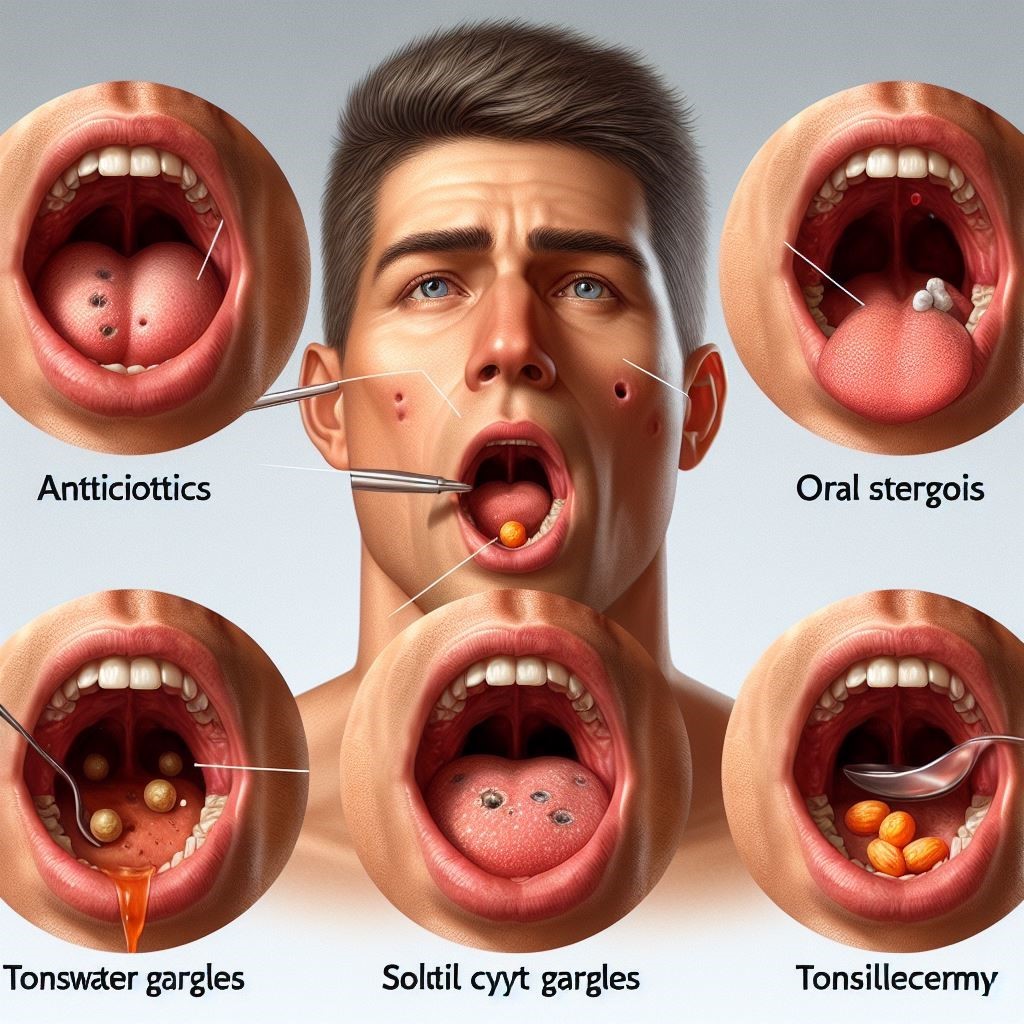
If your ENT doctor determines that your enlarged tonsil holes contribute to repeated pharyngitis or tonsillitis bouts, they may recommend treatments to eliminate bacteria and debris buildup.
Common medical treatments for infected holes in tonsils include:
- Antibiotics – prescription antibiotic therapy targets bacterial organisms lodged in the tonsil crypts.
- Oral steroids – steroids help reduce inflammation of the tonsil tissue.
- Saltwater gargles – gargling with salt water helps dislodge debris and soothe irritation.
- Tonsil crypt debridement – manually removing the material and filling the holes in tonsils.
- Tonsillectomy – surgically removing the tonsils for chronic symptoms.
Identifying any cysts, polyps, or abscesses related to enlarged tonsil holes early is key to preventing complications and avoiding tonsillectomy surgery if possible. But if you have frequent bouts of sore throat and tonsillitis that do not resolve with more conservative treatment, your ENT specialist may advise tonsil removal for definitive relief.
At-Home Remedies for Holes in Tonsils Discomfort
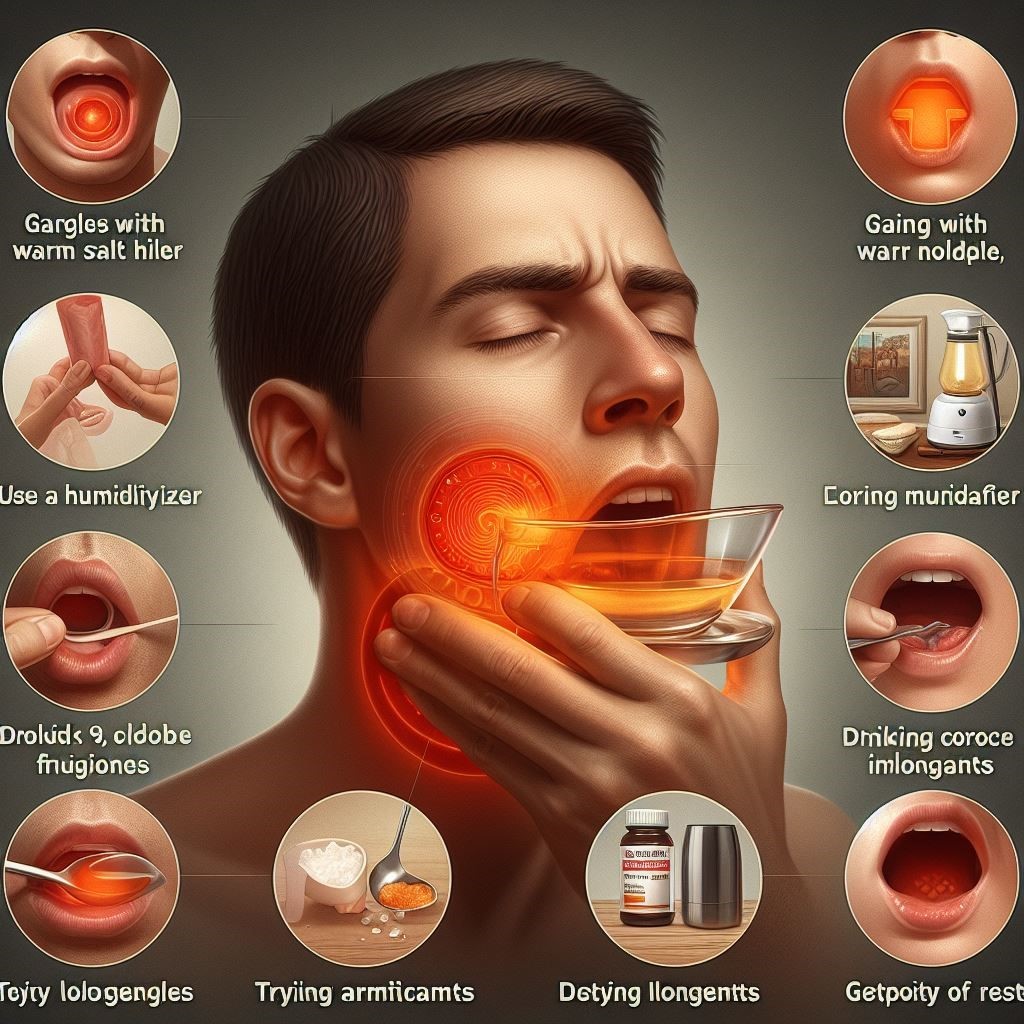
Alongside medical therapies, you can help manage irritation from inflamed holes in tonsils using at-home care strategies:
- Gargle with warm salt water – helps flush out debris and eases swelling.
- A humidifier adds moisture to the air, soothing dry, irritated tissue.
- Take OTC pain relievers – reduces localized discomfort in the tonsils.
- Drink cold fluids – ice water or popsicles can numb sore areas temporarily.
- Avoid irritants – stop smoking and lay off spicy foods during flare-ups.
- Try throat lozenges – menthol and benzocaine can temporarily numb pain.
- Get plenty of rest – allow your body to heal faster.
While most holes in tonsils are harmless, be sure to see your doctor if you experience severe pain or obstructive symptoms. Prompt treatment can nip tonsil problems in the bud and prevent future complications.
When to Seek Medical Care for Holes in Tonsils
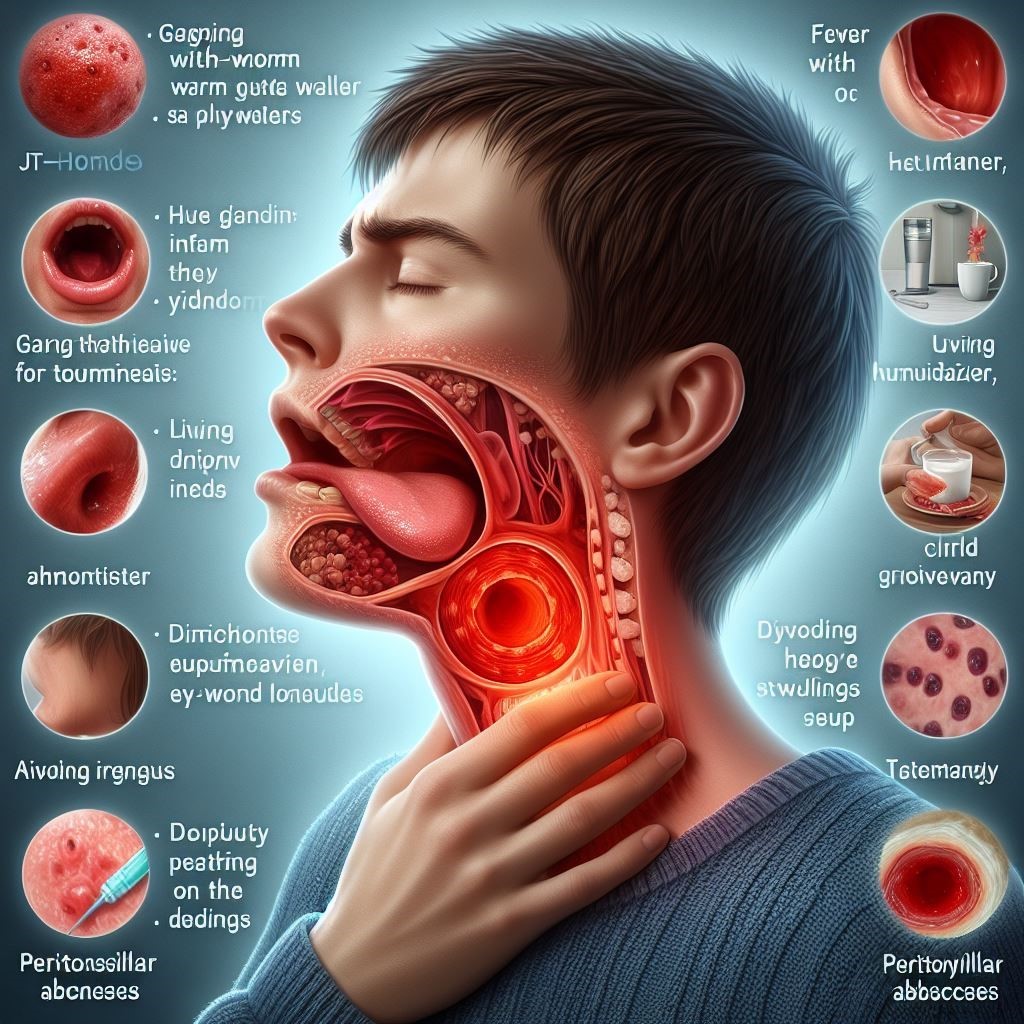
In most cases, holes in tonsils are normal and not a cause for concern. However, you should schedule an appointment with your healthcare provider if you experience:
- Localized pain and soreness around enlarged tonsil holes
- Difficulty swallowing foods, drinks, or saliva
- A persistent sore throat and swollen tonsils
- Foul breath persists despite oral hygiene
- White/yellow discharge from the holes in tonsils
- Fever, chills, and body aches accompanying throat symptoms
These could signal an underlying infection or abscess that requires antibiotic treatment or drainage. Though rare, severely infected holes in tonsils may also need surgical removal if they do not improve with more conservative therapies.
Getting evaluated quickly at the first signs of irritated holes in tonsils helps prevent complications and future flare-ups. Don’t ignore sore throat symptoms associated with your tonsil pits.
When Are Tonsil Holes Nothing to Worry About?
Not all holes in tonsils require intervention. In many cases, enlarged tonsil crypts are simply a normal part of your anatomy. Here are some signs benign holes in tonsils are nothing to be concerned about:
- Asymptomatic – no pain, irritation, or difficulty swallowing
- Appear small and shallow – not deep, infected pits
- Tonsils are normal size – not swollen
- Only mild sore throat – no severe pain from the holes
- No persistent foul breath or discharge from the holes
- No fever, fatigue, or other systemic symptoms
If the holes in tonsils are not currently bothering you, there is no need for treatment. But be sure to follow up with your doctor if you develop worrisome symptoms.
How Can I Prevent Holes in Tonsils From Flaring Up?
You can reduce your risk of enlarged, irritated holes in your tonsils worsening by:
- Practicing oral hygiene – brush your teeth 2x daily and see your dentist regularly
- Quitting smoking and avoiding secondhand smoke
- Drinking lots of water – staying hydrated keeps your throat moist
- Limiting irritants – curb intake of spicy and acidic foods/drinks
- Treating allergies – reducing postnasal drip prevents throat irritation
- Getting adequate sleep – allows your body to heal faster
- Handwashing – wash hands frequently to avoid transmitting infections
Following healthy habits makes it less that tonsillitis and debris buildup will exacerbate the holes in your tonsils. Be vigilant if symptoms do occur, and see an ENT specialist promptly for evaluation and treatment.
Key Takeaways About Holes in Tonsils
- Holes in tonsils, also called tonsil crypts, are normal anatomical features that develop as you age. More than 90% of people have them.
- Enlarged, irritated tonsil holes may indicate debris and infection retention. This can cause bad breath, sore throats, and trouble swallowing.
- If problematic holes in tonsils persist despite at-home care, medical treatments like antibiotics, debridement, or tonsillectomy may be warranted.
- Most of the time, holes in tonsils are harmless and require no intervention. Monitor for symptoms and follow up with an ENT if issues arise.
- Practicing good oral hygiene and avoiding irritants can help prevent flare-ups of sore, enlarged holes in tonsils.
Though finding holes in tonsils can be alarming, they are a normal part of your tonsils’ anatomy in most cases. But be vigilant about any worrisome symptoms and see your doctor promptly if the holes appear infected or you have difficulty swallowing. Identifying and treating any problematic tonsil pits early is key!
FAQs frequently asked questions.
What causes holes in the tonsils?
Holes or crypts in the tonsils are normal in your anatomy and develop as you age. They form as the tonsils grow, tissue folds, and pockets to help trap germs and prevent infection. Recurrent infections, inflammation from tonsillitis, trapped debris, and aging can make these holes appear more prominent, but they are usually harmless.
Will tonsil stone holes go away?
Tonsil stone holes, or crypts that collect calcified debris and bacterial colonies, often do not fully go away on their own. Gargling with salt water and manually removing the stones may provide temporary relief, but the tonsil anatomy allows new stones to continue forming. Removing the tonsils surgically is the only definitive way to prevent recurrent tonsil stones and holes from returning.
What do unhealthy tonsils look like?
Unhealthy tonsils are often swollen, with enlarged or reddened holes/pits. Yellow or white debris may be lodged in the holes. Severe pain and difficulty swallowing can accompany infected, irritated tonsil tissue. Chronic bad breath and frequent sore throats are also signs that your tonsils may be unhealthy and require medical attention.
Should pitted tonsils be removed?
If enlarged, pitted tonsils are causing repeat bouts of severe tonsillitis and throat infections that do not resolve with antibiotics or other treatments; surgical removal may be warranted. Tonsillectomy is also sometimes recommended when deep crypts retain debris and stones, causing halitosis and discomfort. Your ENT doctor can advise if removing your pitted tonsils is appropriate to prevent recurrent problems.

Adel Galal is a health and wellness writer with over 30 years of experience studying and writing about health, fitness, nutrition, and healthy living. He is the founder of NextFitLife.com, where he shares practical, evidence-based guidance to support long-term health at any age. Adel’s mission is simple:
to help people make smarter health choices that fit real life, at any age.

